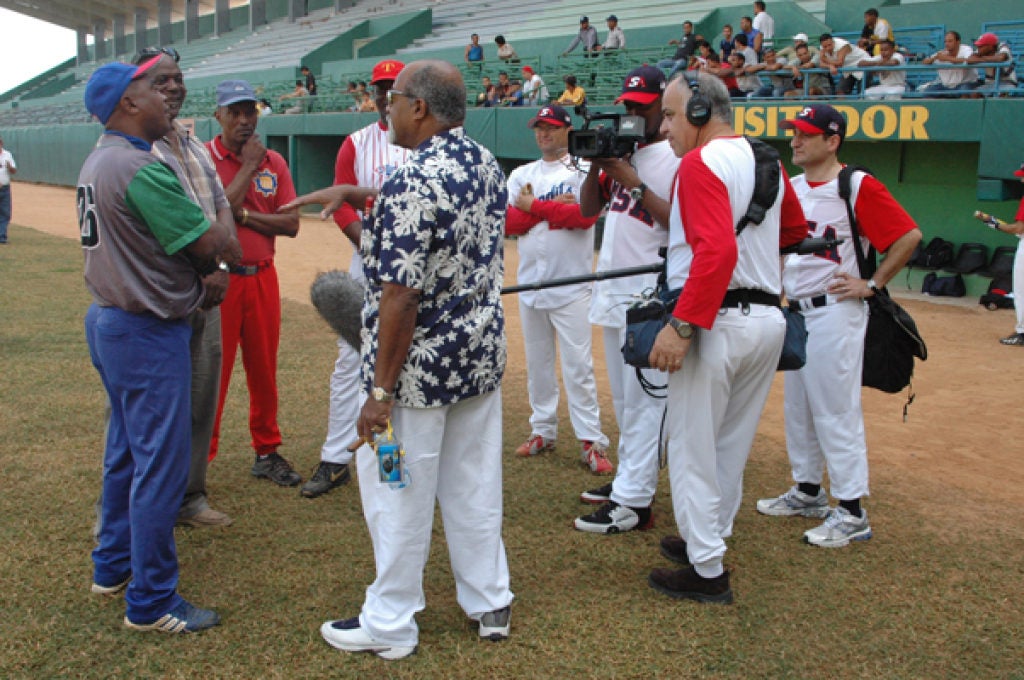By Chlotrudis Independent Film Society
Rating: 4.5 cats
Director: Jonathan Hock

Country: united_states
Year: 2009
Running time: 102
IMDB: http://www.imdb.com/title/tt1362435/
Jason says: “If THE LOST SON OF HAVANA were fictional, there’s a good chance that people would call its screenplay ridiculous. After all, it features the World Series, the Negro Leagues, multiple incredible returns from injury, baseball bringing about a reunion of fathers and sons, escapes from Cuba, and a comedic return. It is, more or less, everything a person might try to fit into a baseball movie, and the fact that it’s all true doesn’t diminish director Jonathan Hock’s work at all.
“It’s worth remembering Hock’s name, because it will probably be overshadowed in any promotion by the producers, Bobby and Peter Farrelly. The beginning of the film has a bit that’s off-the-wall funny enough that the brothers should absolutely consider poaching it for a feature: In order for the documentary crew to travel with baseball great Luis Tiant on a trip to Cuba to visit old friends and family for the first time in 46 years, they must come in with a baseball team playing a goodwill exhibition game in Havana suburb Piñar del Rio – and while Tiant is allowed to come as a coach, the filmmakers must play. Tell me there’s not a movie funnier than THE HEARTBREAK KID in there.
“That’s not the movie Hock’s making, though. The initial levity of the game passes, and the filmmakers get to the main business of why they came: Following Tiant into Havana as he returns to his old neighborhood to seek out the family and friends he left behind when in 1961, at the age of 20, he followed his father’s advice and opted not to return to Cuba after Fidel Castro took power. The people he meets on his quest are interesting: There’s Juan Carlos Oliva, brother of Minnesota Twins star Tony Oliva, who played ball as a youth, was a tank commander in Castro’s army, and later became a coach. There’s a childhood friend by the name of Fermin, who displays a fascinating mix of sentiment and envy when he encounters Tiant. And there’s his family; his aunts are sometimes unable to stand and embrace him, but there are plenty of members of the younger generation to fill out the house.
“While Tiant reacquaints himself with Cuba, the film reacquaints the audience with Tiant – or introduces him to those of us who are too young to remember his career in any detail. We learn about him winning the Cuban rookie of the year award in 1960, signing with the Cleveland Indians, and then suffering from a broken scapula that would have ended most careers in 1970. Instead, he completely rebuilt his mechanics to become a star and fan favorite with the Red Sox from 1971 to 1978. There’s hugely entertaining game footage of him – no matter how many times one sees his bizarre wind-up, which at one point has him actually facing center field, it’s still something that’s tough to believe. We also hear from teammates Carl Yastrzemski, Carlton Fisk, and others, such as former Boston Globe baseball writer Peter Gammons.
“That’s just one Luis Tiant, though – we also learn about his father, Luis ‘Lefty’ Tiant Sr., who came to the U.S. in 1931 to play in the Negro Leagues, where he was an all-star known for his bewildering array of pitches and deliveries. It’s said he invented the screwball, and struck out Babe Ruth in an exhibition game between Major League and Negro League all-stars. For young Luis, his father cast quite a shadow, and he carries around an old photograph of Lefty, looking prematurely aged in a dugout.
“For much of the movie, that picture is the only image we have of Lefty, and it’s a fine visual reminder of how things can become far-off or forgotten: This is all the connection Luis has to his father after the revolution, and how the Negro Leagues have become a piece of baseball history that is under constant threat of being forgotten. It’s one of the things that Hock does well here, stitching the various pieces of his story together more closely than maybe the average sports documentarian manages. He does a nice job of moving between the visit to Cuba and the respective baseball careers of Luis and Lefty, so that nothing seems favored or neglected when it comes time to connect the threads. He manages to highlight difference in wealth between America and Cuba without making the Cubans the objects of pity. One thing he does, which may or may not be deliberate, is to switch between sharp and grainy footage while in Cuba. The grainy footage is presented as if to represent the past, but it eventually becomes clear that it’s contemporary, just shot or processed differently, and the fact that we assume it shows Cuba as it was fifty years ago just shows how little the place has changed during the Castros’ regime.
“There’s a moment in the film when narrator Chris Cooper informs us that Havana initially feels as alien to Tiant as America did, once upon a time. It all comes back to him, of course; if we’ve learned anything from the movies, it’s that baseball cuts across generations, whether it be between a father and a son or a son and a country.
4 1/2 cats
“Seen 25 April 2009 at the Somerville Theater #1 (Independent Film Festival of Boston)”
